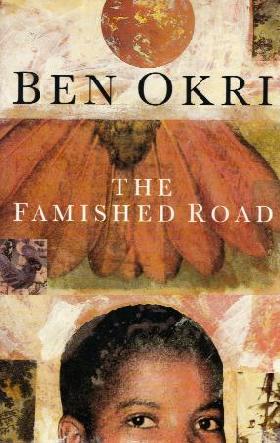
Ben Okri
The following novels constitute the shortlist for the 1991 Booker Prize:
The judging panel for 1991 was chaired by Jeremy Treglown and was made up of the novelists Penelope Fitzgerald, Jonathan Keates, Nicholas Mosley and Ann Schlee.
Notable Omissions from the 1991 Shortlist

|
The Famished Road Ben Okri |
Dustjacket synopsis:
"Azaro is a spirit-child. When he was born his mother recognised him and this recognition
brought her sadness. For the spirit-child is one who has not severed his links with the
spirit world that most children abandon at birth, his memory of that idyllic life remains
strong and he yearns to return, has promised to return to his spirit companions and to leave behind
his parents and the world of the living. It is this knowledge that causes his parents'
sorrow. Only now, Azaro is tired of coming and going, of being born and reborn, of never
staying long enough to experience life. This time he decides to stay. This time he has
resolved to make his mother smile.
"The Famished Road sets out to explode conventional ideas of naturalistic reality as it follows Azaro's adventures through a world where reality and vision blur. Endowed with special powers that lead him periodically into mischief, pursued by his spirit friends who are reluctant to let him go, Azaro persuades them to see the world through his eyes - a teeming exuberant world crowded with heroes and villians and ordinary folk, with political shysters, debtors and creditors, landlords and tenants, fathers and sons. Ambitious in scope and execution, The Famished Road is a magical novel."
First Paragraph:
In the beginning there was a river. The river became a road and the road branched out to the whole world. And because the road was once a river it was always hungry.
In that land of beginnings spirits mingled with the unborn. We could assume numerous forms. Many of them birds. We knew no boundaries. There was much feasting, playing, and sorrowing. We feasted much because of the beautiful terrors of eternity. We played much because we were free. And we sorrowed much because there were always those amongst us who had just returned from the world of the Living. They had returned inconsolable for all the love they had left behind, all the suffering they hadn't redeemed, all that they hadn't understood, and for all that they had barely begun to learn before they were drawn back to the land of origins.
From the Jonathan Cape hardback edition, 1991.
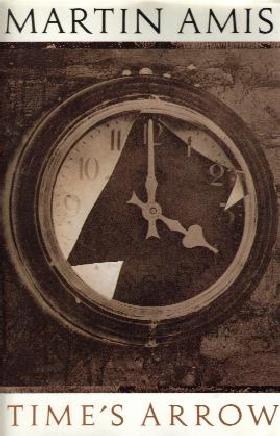
|
Time's Arrow Martin Amis |
Dustjacket synopsis:
"How many times have I asked myself: when is the world going to start making sense? Yet
the answer is out there. It is rushing towards me over the uneven ground. Nobody knows
I'm here: I'm stuck with this man, brutally yoked to Tod and his nightmare visions - the
white coat, the black boots, the bloodstained rubber bib. My future, his past. If only
things could be reversed. But time is heading on now towards something. It pours past
unpreventably, like the reflections on a windscreen as the car speeds through city or
forest. It's out there, and I'm in here.
"In Martin Amis's new novel the narrator is trapped - and hurtling towards a terrible secret. Its resolution, and the dread revelations it brings, ally to give an excoriating vision of guilt."
First Paragraph:
I moved forward, out of the blackest sleep, to find myself surrounded by doctors . . . American doctors: I sensed their body hair; and the forbidding touch of their forbidding hands - doctor's hands, so strong, so clean, so aromatic. Although my paralysis was pretty well complete, I did find that I could move my eyes. At any rate, my eyes moved. The doctors seemed to be availing themselves of my immobility. They were, I sensed, discussing my case, but also other matters having to do with their copious free time: hobbies, and so on. And the thought came to me, surprising in its fluency and confidence, fully formed, fully settled: How I hate doctors. Any doctors. All doctors. Consider the Jewish joke, with the old lady running distractedly along the sea shore: Help! My son the doctor is drowning! Amusing, I suppose. Her pride, I suppose, is amusing: it is greater than her love. But why the pride in these doctor children (why not shame, why not incredulous dread?): intimates of bacilli and trichinae, of trauma and mortification, with their disgusting vocabulary and their disgusting furniture (the bloodstained rubber bib, hanging on its hook). They are life's gatekeepers. And why would anyone want to be that?
From the Jonathan Cape hardback edition, 1991.
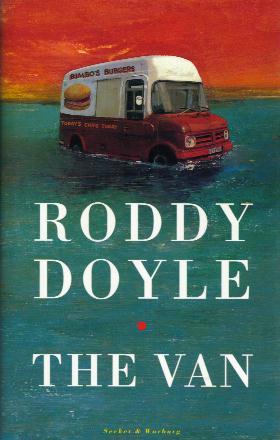
|
The Van Roddy Doyle |
Dustjacket synopsis:
"Roddy Doyle's The Commitments was acclaimed as the freshest and funniest first novel
for years. His second novel, The Snapper, confirmed his reputation as the most
exciting new voice in Irish fiction, a comic writer of genius.
"Doyle's subject is everyday life in Barrytown, north Dublin, and in particular the triumphs and tragedies of the Rabbitte family. In The Van, Jimmy Rabbitte Sr is unemployed; his children are growing up; the top button of his trousers won't close for him anymore. He's miserable. His best friend, Bimbo, is made redundant and they're both miseable together. Then Bimbo buys a decrepit fish-and-chip van. -Which end does it shite out of? Jimmy Sr asks him, but Bimbo buys it anyway and asks Jimmy Sr to be his partner.
"Set during the heady days of Ireland's triumphs during the world Cup, The Van follows Jimmy Sr and Bimbo as they haul their mobile food outlet through Barrytown, selling grub to the drunk and the hungry, one step ahead of the environmental health officers.
"A tender tale of male friendship, swimming in grease and stained with ketchup, The Van reveals yet again Roddy Doyle's 'astonishing talent for turning the humdrum into high comedy' (The Times)."
First Paragraph:
Jimmy Rabbitte Sr had the kitchen to himself. He felt a draught and looked up and Darren, one of his sons, was at the door, looking for somewhere to do his homework.
-Oh-, said Darren, and he turned to go back into the hall.
-D'yeh need the table, Darren? said Jimmy Sr.
-Eh-
-No, come on. Fire away.
Jimmy Sr stood up. His arse had gone numb on him.
-Jesus!-
He straightened up and grinned at Darren.
-I'll go somewhere else, he said.
-Thanks, said Darren.
-Not at all, said Jimmy Sr.
From the Seeker & Warburg hardback edition, 1991.
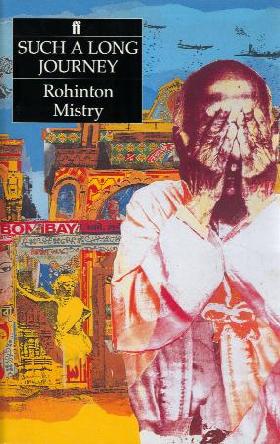
|
Such a Long Journey Rohinton Mistry |
Dustjacket synopsis:
"Such a Long Journey is set in Bombay against the backdrop of war in the Indian
subcontinent and the birth of Bangladesh. The novel tells the story of Dr Gustad Noble, an
ordinary man, and the peculiar way in which the conflict impinges on the lives of him and his
family.
"Gustad Noble's dreams and aspirations are quite modest, but when circumstances conspire to deny him even these modest expectations, he finds it hard to accept that he cannot make things happen the way he wants them to. As the novel unfolds, he discovers that there are other forces at play, larger than he, and largely inexplicable. So begin the trials of Gustad Noble: the loss of a dear friendship, the son's betrayal of his father's dream, the illness of Gustad's daughter, his friend Dinshawji's death. As Gustad Noble slowly modifies his dreams, and trims down his expectations of life, he comes to accept that he is not in control of events. It is his manner of enduring these trials that is his triumph.
"For Gustad, there is no God who appears at the end of his tribulations to explain things or to dispense justice, no God to reassure him that he has passed the test and that all will be well. And yet, Gustad survives without succumbing to any prolonged despair or bitterness, still in possession of his essential human dignity.
"Such a Long Journey is a brilliant first novel by one of the most remarkable writers to have emerged from the Indian literary tradition in many years."
First Paragraph:
The first light of morning barely illuminated the sky as Gustad Noble faced eastward to offer his orisons to Ahura Mazda. The hour was approaching six, and up in the compound's solitary tree the sparrows began to call. Gustad listened to their chirping every morning while reciting his kusti prayers. There was something reassuring about it. Always, the sparrows were first; the cawing of the crows came later.
From a few flats away, the metallic clutter of pots and pans began nibbling at the edges of stillness. The bhaiya sat on his haunches beside the tall aluminium can and dispensed milk into the vessels of housewives. His little measure with its long, hooked handle dipped into the container and emerged, dipped and emerged, rapidly, with scarcely a drip. After each customer was served, he let the dipper hang in the milk can, adjusted his dhoti, and rubbed his bare knees while waiting to be paid. Flakes of dry dead skin fell from his fingers. The women blenched with disgust, but the tranquil hour and early light preserved the peace.
From the Faber and Faber hardback edition, 1991.
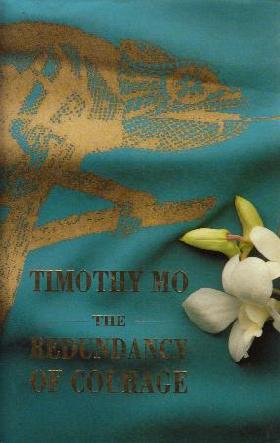
|
The Redundancy of Courage Timothy Mo |
Dustjacket synopsis:
"Adolph Ng, an effete, Canadian-educated hotel owner of Chinese origin, leads a placid existence on Danu,
the eastern half of an island to the north of Australia. he and his companons - the fiery and radical Rosa
Soares, the quiet but formidable Dr Maria Nolasco da Silva, the clever but dissatisfied Raoul Garcia, and the
dignified ex-seminarian Martinho Oliveira - meet in the cafes and bars to trade salacious gossip and forge the
policies of FAKOUM, the government of their newly-independent homeland, with equal vigour.
"Their lives are dramatically altered by the invasion of Dabu by the malais, their powerful expansionist neighbours. When the malais set up a brutal miliatry regime, Adolph is forced into the hills to join FAKINTIL, the military arm of FAKOUM, led by the indominable Osvaldo Oliveira. With uncompromising candour Adolph recounts the realities of a fierce and desperate war of resistance, as he and those around him adapt to the harsh laws of guerrilla life. New alliances are formed; beliefs and morals are confused; distinctions between bravery and cruelty, nobility and cowardice become unclear and men and women undergo transformations: ex-seminarians develop into generals, children turn into ruthless fighters and relatives become the enemy.
"Timothy Mo's new novel is a story of sacrifice and friendship in terrible times, told with compelling simplicity, narrative drive and unexpected humour. With the urgency of a thriller and a rare depth of political insight and compassion, The Redundancy of Courage confirms Timothy Mo as a novelist of scope, power and distinction."
First Paragraph:
I don't want them forgotten: Rosa, Osvaldo, Raoul, Maria, Martinho, Arsenio. It would be easy to say in the glib way of those who can lead uninterrupted lives in placid places that such oblivion would be a fate worse than death. No fate is worse than death.
My first sight on that day, and the strongest picture still, stronger than all the bad things which came later, was of parachutes dropping; drifting as if they were thistledown or broken cotton-pods: silent, smooth, white. By some freak of weather the sky was cloudless that day, freakish for it was the monsoon season - the 7th December to be precise - and the falling chutes appeared almost as a natural phenomenon against the blue, in the place of clouds. There was nothing, it seemed, out of the ordinary about them, certainly nothing that could be conceived as a danger - the sky suddenly blossoming with a thousand canopies. (It was a reinforced battalion, as I now know.) At the time I was shaving in the yard. I did not cut myself. I rinsed my neck, towelled carefully, slapped my cheeks with some cologne. In those days I could be fastidious about my toilet. Our monkey ran at me, chattering and grimacing, showing his yellow teeth. Poor Chico. I flicked some foam and sent him complaining up the jack-fruit tree to the end of his tether. In the hotel I put on a fresh singlet and starched white shirt, then stepped outside to where I had left my Yamaha parked under the shade of the jacaranda. I didn't lock the office. The guests had long since deserted the place and I had nothing to hide from old Carvalho, the gardener.
From the Chatto & Windus hardback edition, 1991.
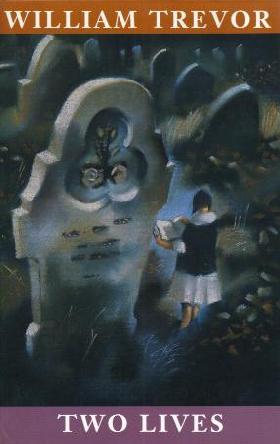
|
Reading Turgenev William Trevor |
Dustjacket synopsis:
"Two Lives comprises two major novels by William Trevor, linked by theme.
"In Reading Turgenev, young, ingenuous Mary Louise Dallon, fearful of being trapped in her parents' cramped farmhouse, cannot resist the limited attractions of the nearby small town, and marries into it only to discover a despair and desolation that her sheltered girlhood had not exposed her to. When she is rescued, it is not by a stalwart lover but by a bespectacled boy in poor health who reads her Turgenev in a deserted country churchyard.
"In My House in Umbria, Mrs Emily Delahunty - otherwise Gloria Grey or Cora Lamore - writes romantic fiction in her retirement. Influenced by the cunning of her factotum, Quinty, she has given up being the madam of an African brothel in order to live in Umbria. Travelling by train to Milan one May morning in 1987, she finds herself one of the survivors of a terrorist bomb. In a local hospital she comes to know some of the others: an elderly English general, an American child and a German boy, and she takes them all to convalesce at her villa.
"Published together, these novels tell of the importance of fictions in two women's lives, and in startling juxtaposition they serve to demonstrate unequivocally William Trevor's astounding range and importance as a writer. Evoking in turn the landscapes of Ireland and Italy, these two novels are written with a precision, power and humour that is unique."
First Paragraph:
A woman, not yet fifty-seven, slight and seeming frail, eats carefully at a table in a corner. Her slices of buttered bread have been halved for her, her fried egg mashed, her bacon cut. 'Well, this is happiness!' she murmurs aloud, but none of the other women in the dining-room replies because none of them is near enough to hear. She's privileged, the others say, being permitted to occupy on her own the bare-topped table in the corner. She has her own salt and pepper.
'Hurry now.' Appearing from nowhere, Miss Foye curtly interrupts the woman's private thought. 'You have a visitor waiting.'
'Would be Peter Martyr.' Another woman, overhearing the news about a visitor, makes this suggestion, but at once there's a general objection. Why should the visitor be identified so since the lone woman wouldn't lift a hand to take the knife from his head, Peter Martyr not being of her religion?
From the Viking hardback edition, 1991.
Notable Omissions from the Shortlist:
"Alma Cogan", Gordon Burn (winner of the 1991 Whitbread First Novel Award)
"Wise Children", Angela Carter
"A Strange and Sublime Address", Amit Chaudhuri
"The Queen of the Tambourine", Jane Gardam (winner of the 1991 Whitbread Novel Award)
"The Buddha of Suburbia", Hanif Kureishi
"The Sins of the Father", Alan Massie
"Chapel Street", Sam North
"Mr Wroe's Virgins", Jane Rogers
"Downriver", Iain Sinclair
This page and its contents are copyright © 2002-06 by Perry Middlemiss, Melbourne, Victoria, Australia.
Last modified: March 20, 2006.